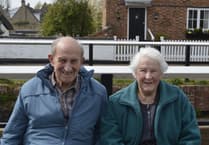A WOMAN from Alton has spoken about surviving a brain tumour despite being told to “rest and watch Netflix” after it started causing her severe headaches.
Lisa Thomas, 46, suffered dizziness and passed out while working as an air traffic controller in October 2016. In May 2017 she was taken by ambulance to the Royal Hampshire County Hospital in Winchester with an awful headache.
She said: “I’d never felt pain like it. When I got to the hospital I felt as though I was being treated as a time waster, as staff were quite dismissive and I was told to take antibiotics.
“The junior doctor even said to me it’s nothing serious and that I should go home, rest and watch Netflix to help me relax.”
Lisa returned to her GP and was referred to an ear, nose and throat clinic, but she paid for a private scan at the Nuffield Health Wessex Hospital in Eastleigh which found the tumour.
Steroids stopped the headaches and on July 17, a week and a half after the mother-of-two was diagnosed with a glioblastoma multiforme tumour, surgeons at Southampton General Hospital removed it.
If it had remained she was likely to live for between 12 and 18 months.
Lisa said: “It felt like a relief that the tumour was accessible and could be removed but I was very scared. I remember looking it up online and finding out the awful prognosis. At first I couldn’t look at my two boys without crying, imagining them growing up without me being around. My family has been incredibly supportive.
“My parents sold their house in Scotland and moved to be closer to us, as we didn’t know what was going to happen.”
Surgeons placed Gliadel wafers containing chemotherapy drug carmustine over the area from where the tumour was removed. They are designed to dissolve and drip chemotherapy treatment to eliminate any cells left by the tumour. Eight weeks of radiotherapy and chemotherapy followed.
Lisa is among the five per cent of people to have lived for more than five years after such a diagnosis. She said: “I wanted to wait until I was five years clear to share my story, to help offer hope to at least one other person at a time when they may really need it.”
Hugh Adams, head of stakeholder relations at Brain Tumour Research, said: “Lisa’s story is one of hope and we’re thrilled to hear she has outlived her initial prognosis.”





Comments
This article has no comments yet. Be the first to leave a comment.